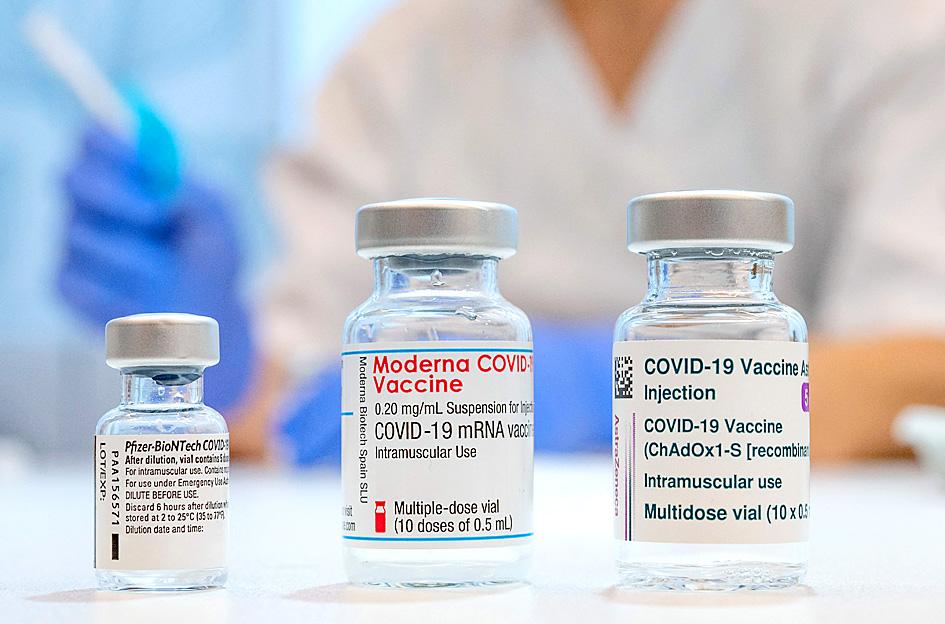A survey of Taiwanese adults this month showed that more than 60 percent are willing to be vaccinated against COVID-19, but just 1 percent would accept China-made vaccines, the Chinese-language Global Views monthly magazine said.
If the vaccinations are funded by the government, 60.3 percent of respondents said they would get the inoculation, 32.7 percent would not and 7 percent said they had not yet decided.
Of those willing to be vaccinated, 65.4 percent of men said they would get the vaccine, while only 55.5 percent of women welcomed it.

Photo: AFP
People in the transportation and healthcare industries are more willing to receive the vaccine, at 79.4 percent and 75.8 percent respectively, compared with other fields.
The survey also showed that 59.8 and 57.1 percent of respondents were confident in the “efficacy” and “safety” of current vaccines in preventing COVID-19 infection respectively, while 29.4 percent and 32.2 percent respectively still had doubts.
Given a choice, 54.8 percent said they would prefer vaccines made in Taiwan, 31.8 percent preferred those made in Europe or the US and 1.3 percent preferred Chinese vaccines, while 5.7 percent said all vaccines were the same.
Minister of Health and Welfare Chen Shih-chung (陳時中), who heads the Central Epidemic Command Center, said that the survey’s results were similar to the center’s previous survey in which 66.1 percent of respondents were willing and 27.9 percent were not willing to be vaccinated.
The slight difference might be because the center had surveyed more healthcare professionals and frontline disease prevention workers, who might be more willing to be vaccinated, he said.
The willingness of people to be vaccinated against any disease might be affected by the drug’s efficacy and safety, and the disease situation, Chen said.
He said he believed that if the government is transparent in releasing scientific information about the vaccines, people would become more confident about getting vaccinated.
The telephone survey of Taiwanese aged 18 years and older was conducted from Feb. 4 to Feb. 7, with 1,145 valid questionnaires collected.

SEPARATE: The MAC rebutted Beijing’s claim that Taiwan is China’s province, asserting that UN Resolution 2758 neither mentions Taiwan nor grants the PRC authority over it The “status quo” of democratic Taiwan and autocratic China not belonging to each other has long been recognized by the international community, the Mainland Affairs Council (MAC) said yesterday in its rebuttal of Beijing’s claim that Taiwan can only be represented in the UN as “Taiwan, Province of China.” Chinese Minister of Foreign Affairs Wang Yi (王毅) yesterday at a news conference of the third session at the 14th National People’s Congress said that Taiwan can only be referred to as “Taiwan, Province of China” at the UN. Taiwan is an inseparable part of Chinese territory, which is not only history but

NATIONAL SECURITY: The Chinese influencer shared multiple videos on social media in which she claimed Taiwan is a part of China and supported its annexation Freedom of speech does not allow comments by Chinese residents in Taiwan that compromise national security or social stability, the nation’s top officials said yesterday, after the National Immigration Agency (NIA) revoked the residency permit of a Chinese influencer who published videos advocating China annexing Taiwan by force. Taiwan welcomes all foreigners to settle here and make families so long as they “love the land and people of Taiwan,” Premier Cho Jung-tai (卓榮泰) told lawmakers during a plenary session at the Legislative Yuan in Taipei. The public power of the government must be asserted when necessary and the Ministry of

CROSSED A LINE: While entertainers working in China have made pro-China statements before, this time it seriously affected the nation’s security and interests, a source said The Mainland Affairs Council (MAC) late on Saturday night condemned the comments of Taiwanese entertainers who reposted Chinese statements denigrating Taiwan’s sovereignty. The nation’s cross-strait affairs authority issued the statement after several Taiwanese entertainers, including Patty Hou (侯佩岑), Ouyang Nana (歐陽娜娜) and Michelle Chen (陳妍希), on Friday and Saturday shared on their respective Sina Weibo (微博) accounts a post by state broadcaster China Central Television. The post showed an image of a map of Taiwan along with the five stars of the Chinese flag, and the message: “Taiwan is never a country. It never was and never will be.” The post followed remarks

Proposed amendments would forbid the use of all personal electronic devices during school hours in high schools and below, starting from the next school year in August, the Ministry of Education said on Monday. The Regulations on the Use of Mobile Devices at Educational Facilities up to High Schools (高級中等以下學校校園行動載具使用原則) state that mobile devices — defined as mobile phones, laptops, tablets, smartwatches or other wearables — should be turned off at school. The changes would stipulate that use of such devices during class is forbidden, and the devices should be handed to a teacher or the school for safekeeping. The amendments also say